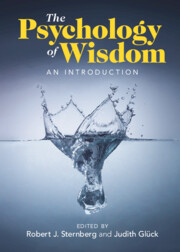Book contents
- The Psychology of Wisdom
- The Psychology of Wisdom
- Copyright page
- Contents
- Figures
- Tables
- Contributors
- Preface
- Part I Introduction to Wisdom Theory and Research
- Part II Foundations of Wisdom in the Individual and in the World
- Chapter 7 Wisdom, Creativity, and Intelligence
- Chapter 8 Wisdom, Morality, and Ethics
- Chapter 9 Wisdom, Personality, and Well-Being
- Chapter 10 The Wisdom in Emotions
- Part III The Modifiability of Wisdom
- Part IV Wisdom in the World
- Index
- References
Chapter 8 - Wisdom, Morality, and Ethics
from Part II - Foundations of Wisdom in the Individual and in the World
Published online by Cambridge University Press: 26 May 2022
- The Psychology of Wisdom
- The Psychology of Wisdom
- Copyright page
- Contents
- Figures
- Tables
- Contributors
- Preface
- Part I Introduction to Wisdom Theory and Research
- Part II Foundations of Wisdom in the Individual and in the World
- Chapter 7 Wisdom, Creativity, and Intelligence
- Chapter 8 Wisdom, Morality, and Ethics
- Chapter 9 Wisdom, Personality, and Well-Being
- Chapter 10 The Wisdom in Emotions
- Part III The Modifiability of Wisdom
- Part IV Wisdom in the World
- Index
- References
Summary
This chapter summarized the theoretical and empirical relationships between wisdom and morality. Wise individuals are able to think carefully and rationally about moral dilemmas, recognizing their own intuitive impulses but not necessarily following them in making decisions. As they think about complex moral dilemmas, they aim to balance the different perspectives, interests, and needs optimally. Their value orientations are focused on a greater good that does not just include members of their own family or group but humanity and the world at large. Because they are good at thinking about moral issues and at dealing with the emotional and social aspects of complex situations, they are likely to also act ethically in difficult situations. Many of the great wisdom exemplars in history stood up for a just cause and accomplished major societal changes by peaceful means. We believe that the ethical aspect of wisdom is particularly important in a time where the world needs good decisions that do not focus on the needs of any particular nation or group. If we want to overcome serious world problems, such as climate change, global pandemics, and rising inequality, we need ethical and wise leaders.
- Type
- Chapter
- Information
- The Psychology of WisdomAn Introduction, pp. 118 - 134Publisher: Cambridge University PressPrint publication year: 2022

